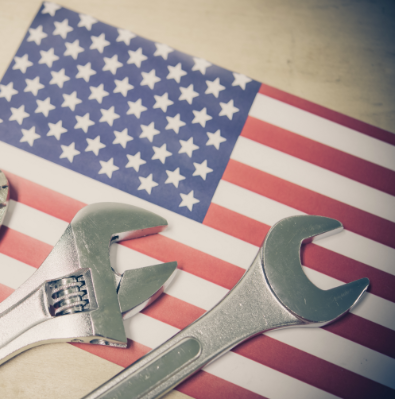There’s a growing recognition amongst economists and industry leaders that the off-shore manufacturing model has peaked and is in decline. A new generation of consumers wants customised products with shorter lead times and they’re also more socially and environmentally aware about their purchasing decisions.
As a result, reshoring — defined as “the practice of transferring a business operation that was moved overseas back to the country from which it was originally relocated” — is all the rage these days.
A recent article in Industry Week highlighted this trend towards reshoring in the United States. Since manufacturing employment figures in the US reached record lows in 2010, over 750,000 jobs have been reshored. The companies committed to reshoring cited quality and cost as the main factors for bringing jobs back home. The ‘Trump factor’, including tariffs and the ongoing trade war with China, has also forced companies to rethink their manufacturing processes. Trump’s ‘Make America Great Again’ mantra and his persona may rub some people the wrong way but his policies have had a largely positive impact on US manufacturing jobs.
As a realist, I understand there will always be a place for off-shore manufacturing in low wage economies, but it doesn’t mean I have to like it. And I don’t. For too long now, organisations in the western world have relied upon offshoring the bulk of their manufacturing operations to China and Southeast Asia to prop up their margins. The fact is, this strategy is not, and never has been, a long-term sustainable approach.
Remember when ‘Made in China’ meant cheap? Not so much these days. Jeremy Clarkson, the wonderfully opinionated former host of Top Gear put it best when he said, “There’s no such thing as cheap and cheerful, there’s only cheap and rubbish”. We’re not just buying cheap rubbish anymore, we’re buying expensive rubbish, and most of it ends up in landfill.
That’s not the only negative impact on the environment from offshoring manufacturing jobs. Generally speaking, low wage economies are way behind when it comes to renewable energy sources and pollution control regulations. China, despite its recent high profile push into electric vehicles and renewable energy, is still pumping out ozone-eating CFC emissions when they think the rest of the world isn’t looking. That’s particularly bad news for New Zealanders living with a large hole in the ozone above our heads and the highest rate of skin cancer in the world.
Reshoring might cost companies in the short term but it’s a no-brainer in the long run. For those with the insight and the balls to do it, reshoring could be a winning strategy. It won’t be easy and it certainly won’t be a case of doing things the way we used to. Companies will have to rethink and relearn how they do things. Investment in technology, innovation and automation will be required, and, perhaps more importantly, faith in the fact that consumers are crying out for quality products, that are ethically and environmentally produced right here in New Zealand.

